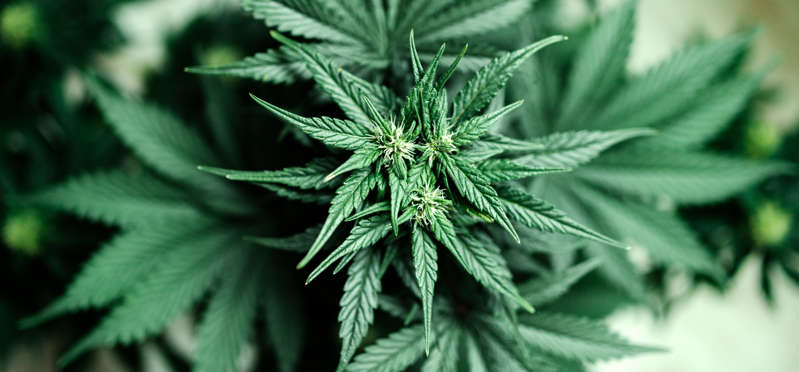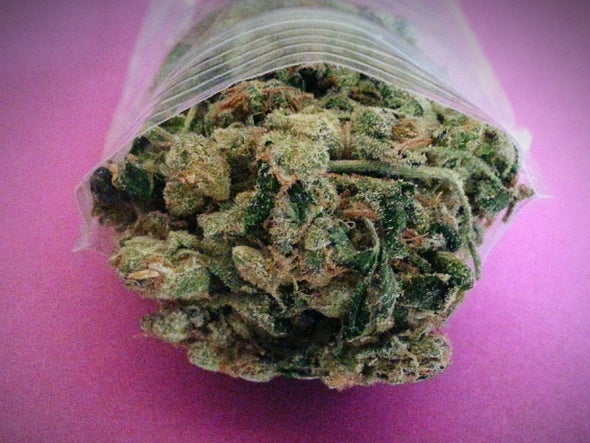You are using an out of date browser. It may not display this or other websites correctly.
You should upgrade or use an alternative browser.
You should upgrade or use an alternative browser.
Law Forum : THE LEGALIZATION OF POT
- Thread starter Kemetstry
- Start date
- Replies 701
- Views 85K
There Is Now a Breathalyzer for Weed
Philip Ellis
A team of researchers in Pittsburgh have invented a small, boxlike device which fulfils the same function as a breathalyzer, except for pot instead of alcohol. It works by detecting THC (delta-9-tetrahydrocannabinol), the main psychoactive compound in cannabis, on the user's breath.
 © Getty
© Getty
"Nanotechnology sensors can detect THC at levels comparable to or better than mass spectrometry, which is considered the gold standard for THC detection," reads the official release from Swanson School of Engineering at the University of Pittsburgh.
The engineers behind the project started to develop the device in 2016, as use of weed was becoming legal in an increasing number of states — presumably with the intention of it then being used by law enforcement to ensure safe and moderate consumption. "If we have a suitable industrial partner, then the device by itself would be quite ready in a few months," Alexander Star, a chemistry professor and the head of the Star Lab at Swanson, told NPR.
However, the accuracy of such a device remains untested, partly because marijuana DUIs are still relatively new, legally speaking (it took lawmakers decades to formalize drink-driving limits). Additionally, computer engineering professor Ervin Sejdic, who worked on the device with Star, says that at present, the correlation between THC levels in a user's blood and how stoned they actually are is "basically missing, from a scientific point of view."
Sejdic adds that further scientific inquiry in this area is required in order to help courts determine what constitutes an "unsafe" level of pot use, but that study is also subject to the permission of the DEA, the acquisition of which isn't exactly easy.
"It's a kind of both ethical and legal issue," he says. "Given that the marijuana is still a Schedule I substance, it's difficult to actually carry out any research related to this substance... I think there will be some push even for the federal government to actually allow researchers to look and correlate these levels of smoking and impairment."
.
Philip Ellis
A team of researchers in Pittsburgh have invented a small, boxlike device which fulfils the same function as a breathalyzer, except for pot instead of alcohol. It works by detecting THC (delta-9-tetrahydrocannabinol), the main psychoactive compound in cannabis, on the user's breath.

"Nanotechnology sensors can detect THC at levels comparable to or better than mass spectrometry, which is considered the gold standard for THC detection," reads the official release from Swanson School of Engineering at the University of Pittsburgh.
The engineers behind the project started to develop the device in 2016, as use of weed was becoming legal in an increasing number of states — presumably with the intention of it then being used by law enforcement to ensure safe and moderate consumption. "If we have a suitable industrial partner, then the device by itself would be quite ready in a few months," Alexander Star, a chemistry professor and the head of the Star Lab at Swanson, told NPR.
However, the accuracy of such a device remains untested, partly because marijuana DUIs are still relatively new, legally speaking (it took lawmakers decades to formalize drink-driving limits). Additionally, computer engineering professor Ervin Sejdic, who worked on the device with Star, says that at present, the correlation between THC levels in a user's blood and how stoned they actually are is "basically missing, from a scientific point of view."
Sejdic adds that further scientific inquiry in this area is required in order to help courts determine what constitutes an "unsafe" level of pot use, but that study is also subject to the permission of the DEA, the acquisition of which isn't exactly easy.
"It's a kind of both ethical and legal issue," he says. "Given that the marijuana is still a Schedule I substance, it's difficult to actually carry out any research related to this substance... I think there will be some push even for the federal government to actually allow researchers to look and correlate these levels of smoking and impairment."
.
'This ain't your mother's marijuana': Surgeon General warns pregnant women and youth about pot risks

By Jacqueline Howard, CNN
Updated 4:33 PM ET, Thu August 29, 2019
Your brain on marijuana 01:39
(CNN)US Surgeon General Dr. Jerome Adams has a warning for pregnant women and teens when it comes to weed.

More pregnant women in the US are using pot, study finds
"No amount of marijuana use during pregnancy or adolescence is safe," Adams said during a press conference Thursday in Washington to announce an advisory on the risks of marijuana use among adolescents and pregnant women.
Adams sounded the alarm about increasing marijuana use among those groups in recent years.
.

By Jacqueline Howard, CNN
Updated 4:33 PM ET, Thu August 29, 2019
Your brain on marijuana 01:39
(CNN)US Surgeon General Dr. Jerome Adams has a warning for pregnant women and teens when it comes to weed.

More pregnant women in the US are using pot, study finds
"No amount of marijuana use during pregnancy or adolescence is safe," Adams said during a press conference Thursday in Washington to announce an advisory on the risks of marijuana use among adolescents and pregnant women.
Adams sounded the alarm about increasing marijuana use among those groups in recent years.
.
Neurological Health
Marijuana May Boost, Rather Than Dull, the Elderly Brain
Senior mice treated with THC improved on learning and memory tests

Credit: Christina Hempfling Getty Images
Picture the stereotypical pot smoker: young, dazed and confused. Marijuana has long been known for its psychoactive effects, which can include cognitive impairment. But new research published in June in Nature Medicine suggests the drug might affect older users very differently than young ones—at least in mice. Instead of impairing learning and memory, as it does in young people, the drug appears to reverse age-related declines in the cognitive performance of elderly mice.
Researchers led by Andreas Zimmer of the University of Bonn in Germany gave low doses of delta-9 tetrahydrocannabinol, or THC, marijuana’s main active ingredient, to young, mature and aged mice. As expected, young mice treated with THC performed slightly worse on behavioral tests of memory and learning. For example, after receiving THC, young mice took longer to learn where a safe platform was hidden in a water maze, and they had a harder time recognizing another mouse to which they had previously been exposed. Without the drug, mature and aged mice performed worse on the tests than young ones did. But after the elderly animals were given THC, their performances improved to the point that they resembled those of young, untreated mice. “The effects were very robust, very profound,” Zimmer says.
Other experts praised the study but cautioned against extrapolating the findings to humans. “This well-designed set of experiments shows that chronic THC pretreatment appears to restore a significant level of diminished cognitive performance in older mice, while corroborating the opposite effect among young mice,” wrote Susan Weiss, director of the Division of Extramural Research at the National Institute on Drug Abuse, who was not involved in the study, in an e-mail. Nevertheless, she added, “while it would be tempting to presume the relevance of these findings [extends] to aging humans ... further research will be critically needed.
When the researchers examined the brains of the treated elderly mice for an explanation, they noticed that neurons in the hippocampus—a brain area critical for learning and memory—had sprouted more synaptic spines, the points of contact for communication between neurons. Even more striking, the gene-expression pattern in the hippocampi of THC-treated aged mice was radically different from that of untreated elderly mice. “That is something we absolutely did not expect: the old animals [that received] THC looked most similar to the young untreated control mice,” Zimmer says.
The findings raise the intriguing possibility that THC and other “cannabinoids” might act as antiaging molecules in the brain. Cannabinoids include dozens of biologically active compounds found in the Cannabis sativa plant. THC, the most highly studied type, is largely responsible for marijuana’s psychoactive effects. The plant compounds mimic our brain’s own marijuanalike molecules, called endogenous cannabinoids, which activate specific receptors in the brain capable of modulating neural activity. “We know the endogenous cannabinoid system is very dynamic; it goes through changes over the life span,” says Ryan McLaughlin, a researcher who studies cannabis and stress at Washington State University and was not involved in the current work. Research has shown that the cannabinoid system develops gradually during childhood, “and then it blows up in adolescence—you see increased activity of its enzymes and receptors,” McLaughlin says. “Then as we age, it’s on a steady decline.”
That decline in the endogenous cannabinoid system with age fits with previous work by Zimmer and others showing that cannabinoid-associated molecules become more scant in the brains of aged animals. “The idea is that as animals grow old, similar to in humans, the activity of the endogenous cannabinoid system goes down—and that coincides with signs of aging in the brain,” Zimmer says. “So we thought, ‘What if we stimulate the system by supplying [externally produced] cannabinoids?’ ”
That idea does not seem so outlandish, considering the role of cannabinoids in maintaining the body’s natural balance, says Mark Ware, a clinical researcher at McGill University, who was not part of the study. “To anyone who studies the endocannabinoid system, the findings are not necessarily surprising, because the system has homeostatic properties everywhere we look,” meaning its effects may vary depending on the situation. For example, a little marijuana may alleviate anxiety, but too much can bring on paranoid delusions. Likewise, cannabis can spark an appetite in cancer patients but in other people may produce nausea. Thus, the detrimental effects seen in young brains, in which cannabinoids are already plentiful, may turn out to be beneficial in older brains that have a dearth of them.
These chemicals also work to maintain order at the cellular level, McLaughlin says. “We know the endogenous cannabinoid system’s primary function is to try to preserve homeostasis within a given brain circuit. It works like an internal regulator; when there’s too much [neuronal] activity, cannabinoids suppress activity to prevent neurotoxicity.” Restoring that protection might help safeguard the brain against cellular stress that contributes to aging. “A critical takeaway of this study is that they used low doses,” Ware says, considering that different doses could have entirely different effects. It would be difficult, if not impossible, to translate the dose they used in mice to a human equivalent, “but it’s clear we’re not talking about vast amounts. We don’t know what would happen with higher doses.”
Scientists do not know exactly how marijuana affects older adults, in part because they have been focused squarely on younger people, who are thought to be at greatest risk. “Because of the public health concern, research has had a very strong focus on marijuana’s effects in adolescence,” Ware says. But although young people make up the largest group of cannabis users, their rate of use has remained relatively stable over the past decade even as the drug has become increasingly available. Meanwhile use among seniors has skyrocketed as the drug’s stigma has faded. A March study showed that in people aged 50 to 64, marijuana use increased nearly 60 percent between 2006 and 2013. And among adults older than 65, the drug’s use jumped by 250 percent.
The researchers do not suggest seniors should rush out and start using marijuana. “I don’t want to encourage anyone to use cannabis in any form based on this study,” Zimmer says.
Older adults looking to medical cannabis to relieve chronic pain and other ailments are concerned about its side effects, Ware says: “They want to know, Does this cause damage to my brain? Will it impair my memory? If these data hold up in humans, it may suggest that [THC] isn’t likely to have a negative impact if you’re using the right dose. Now the challenge is thrown down to clinical researchers to study that in people
Zimmer and his colleagues plan to do just that. They have secured funding from the German government, and after clearing regulatory hurdles, they will begin testing the effects of THC in elderly adults with mild cognitive impairments.
.
Marijuana May Boost, Rather Than Dull, the Elderly Brain
Senior mice treated with THC improved on learning and memory tests
- By Stephani Sutherland on May 10, 2017

Credit: Christina Hempfling Getty Images
Picture the stereotypical pot smoker: young, dazed and confused. Marijuana has long been known for its psychoactive effects, which can include cognitive impairment. But new research published in June in Nature Medicine suggests the drug might affect older users very differently than young ones—at least in mice. Instead of impairing learning and memory, as it does in young people, the drug appears to reverse age-related declines in the cognitive performance of elderly mice.
Researchers led by Andreas Zimmer of the University of Bonn in Germany gave low doses of delta-9 tetrahydrocannabinol, or THC, marijuana’s main active ingredient, to young, mature and aged mice. As expected, young mice treated with THC performed slightly worse on behavioral tests of memory and learning. For example, after receiving THC, young mice took longer to learn where a safe platform was hidden in a water maze, and they had a harder time recognizing another mouse to which they had previously been exposed. Without the drug, mature and aged mice performed worse on the tests than young ones did. But after the elderly animals were given THC, their performances improved to the point that they resembled those of young, untreated mice. “The effects were very robust, very profound,” Zimmer says.
Other experts praised the study but cautioned against extrapolating the findings to humans. “This well-designed set of experiments shows that chronic THC pretreatment appears to restore a significant level of diminished cognitive performance in older mice, while corroborating the opposite effect among young mice,” wrote Susan Weiss, director of the Division of Extramural Research at the National Institute on Drug Abuse, who was not involved in the study, in an e-mail. Nevertheless, she added, “while it would be tempting to presume the relevance of these findings [extends] to aging humans ... further research will be critically needed.
When the researchers examined the brains of the treated elderly mice for an explanation, they noticed that neurons in the hippocampus—a brain area critical for learning and memory—had sprouted more synaptic spines, the points of contact for communication between neurons. Even more striking, the gene-expression pattern in the hippocampi of THC-treated aged mice was radically different from that of untreated elderly mice. “That is something we absolutely did not expect: the old animals [that received] THC looked most similar to the young untreated control mice,” Zimmer says.
The findings raise the intriguing possibility that THC and other “cannabinoids” might act as antiaging molecules in the brain. Cannabinoids include dozens of biologically active compounds found in the Cannabis sativa plant. THC, the most highly studied type, is largely responsible for marijuana’s psychoactive effects. The plant compounds mimic our brain’s own marijuanalike molecules, called endogenous cannabinoids, which activate specific receptors in the brain capable of modulating neural activity. “We know the endogenous cannabinoid system is very dynamic; it goes through changes over the life span,” says Ryan McLaughlin, a researcher who studies cannabis and stress at Washington State University and was not involved in the current work. Research has shown that the cannabinoid system develops gradually during childhood, “and then it blows up in adolescence—you see increased activity of its enzymes and receptors,” McLaughlin says. “Then as we age, it’s on a steady decline.”
That decline in the endogenous cannabinoid system with age fits with previous work by Zimmer and others showing that cannabinoid-associated molecules become more scant in the brains of aged animals. “The idea is that as animals grow old, similar to in humans, the activity of the endogenous cannabinoid system goes down—and that coincides with signs of aging in the brain,” Zimmer says. “So we thought, ‘What if we stimulate the system by supplying [externally produced] cannabinoids?’ ”
That idea does not seem so outlandish, considering the role of cannabinoids in maintaining the body’s natural balance, says Mark Ware, a clinical researcher at McGill University, who was not part of the study. “To anyone who studies the endocannabinoid system, the findings are not necessarily surprising, because the system has homeostatic properties everywhere we look,” meaning its effects may vary depending on the situation. For example, a little marijuana may alleviate anxiety, but too much can bring on paranoid delusions. Likewise, cannabis can spark an appetite in cancer patients but in other people may produce nausea. Thus, the detrimental effects seen in young brains, in which cannabinoids are already plentiful, may turn out to be beneficial in older brains that have a dearth of them.
These chemicals also work to maintain order at the cellular level, McLaughlin says. “We know the endogenous cannabinoid system’s primary function is to try to preserve homeostasis within a given brain circuit. It works like an internal regulator; when there’s too much [neuronal] activity, cannabinoids suppress activity to prevent neurotoxicity.” Restoring that protection might help safeguard the brain against cellular stress that contributes to aging. “A critical takeaway of this study is that they used low doses,” Ware says, considering that different doses could have entirely different effects. It would be difficult, if not impossible, to translate the dose they used in mice to a human equivalent, “but it’s clear we’re not talking about vast amounts. We don’t know what would happen with higher doses.”
Scientists do not know exactly how marijuana affects older adults, in part because they have been focused squarely on younger people, who are thought to be at greatest risk. “Because of the public health concern, research has had a very strong focus on marijuana’s effects in adolescence,” Ware says. But although young people make up the largest group of cannabis users, their rate of use has remained relatively stable over the past decade even as the drug has become increasingly available. Meanwhile use among seniors has skyrocketed as the drug’s stigma has faded. A March study showed that in people aged 50 to 64, marijuana use increased nearly 60 percent between 2006 and 2013. And among adults older than 65, the drug’s use jumped by 250 percent.
The researchers do not suggest seniors should rush out and start using marijuana. “I don’t want to encourage anyone to use cannabis in any form based on this study,” Zimmer says.
Older adults looking to medical cannabis to relieve chronic pain and other ailments are concerned about its side effects, Ware says: “They want to know, Does this cause damage to my brain? Will it impair my memory? If these data hold up in humans, it may suggest that [THC] isn’t likely to have a negative impact if you’re using the right dose. Now the challenge is thrown down to clinical researchers to study that in people
Zimmer and his colleagues plan to do just that. They have secured funding from the German government, and after clearing regulatory hurdles, they will begin testing the effects of THC in elderly adults with mild cognitive impairments.
.
Similar threads
- Replies
- 0
- Views
- 2K
Law Forum :
Feds Targetting New Pot Laws
- Replies
- 23
- Views
- 5K








 ... please make yourself at home ...
... please make yourself at home ... 